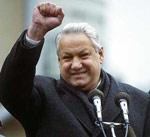Inside Russia's default

Lorraine Courtney reviews Martin Gilman's No Precedent, No Plan: Inside Russia's 1998 Default.
Back before the global economic slump, the IMF was hastily careering down the path towards irrelevance. But that was then. Now, it is back in town, right at the front line of bail-out packages, wrangling over government spending and tax reform.
The IMF's missions are always extremely political and their success fundamentally unpredictable. This is the main message in Martin Gilman's tale of Russia's erratic, often ineffectual, economic reforms in the period between the collapse of the Soviet Union and its default on its domestic debt.
Martin Gilman was the IMF's senior representative in Moscow during the 1990s and so he is a man ideally placed to present a comprehensive account of what went on as the IMF worked with the Russian authorities to steer their rickety post-Soviet world to a functioning market economy. Boris Yeltsins' fast and furious experiment in shock capitalism had resulted in half of Russia's workers not being paid, banks going bust and the rouble on the brink of collapse in 1998. But the IMF wasn't the only possibility of a lifeline and other parallel paths were also pursued.
The IMF stepped in and they quickly discovered that the reality was highly complex and "perhaps more troubling" than was previously thought. Gilman reckons that there was far less outright corruption than is usually believed. Instead he found that the biggest problems facing the country were badly conceived projects and wasteful expenditure.
The Russian government's policy response was often chaotic. Fiscal deficits anticipated future budget revenues that never materialised. In the mid-1990s, Russian targets for tax collection were regularly impeded by a tendency first to overestimate the government's capacity to raise revenues and then, when faced with chronic shortfalls, to resort to apparently attractive shortcuts that promised quick fixes to problems. Their actions were often as absurd as a Daniil Kharms novel. One farcical situation had the Russian government setting up a tax collection agency, apparently without realising that its acronym, VChK, was the same as that of a much-hated Bolshevik secret police force.
Especially unpredictable, Gilman points out, are the odds of troubled economies managing to get themselves back onto an even keel. Ultimately, the IMF had a very minor effect on the course of Russia's recovery, though Gilman won't admit outright that the IMF was out of its depth. He argues that the debt default, although avoidable, actually prompted Russia to integrate its economy with the rest of the world and he suggests that the IMF helped Russia avoid an even greater catastrophe. Though he downplays the part that rising oil prices played in the drama.
Looking for bleak reminders of Stalinism? You'll find them in spades in Russia today. Looking for gangster capitalism? You'll see that, too. Russia's economy is far from genuinely free. Markets exist alongside much arbitrary regulation, control and corruption. But there is a central fact that is easily overlooked: Russia has progressed within two decades from ruin to economic resurrection. Gilman warns that Russia's institutional problems, including the absence of much rule of law, still persist. Inflation is still an issue. Regional inequality is immense. Incomes in some parts of the country are just 5% of the typical Muscovite's take-home pay. But the economy is growing and the poverty rate was halved in the ten years to 2009.
Gilman presciently says that the 1998 Russian default is just a precedent for sovereign debts in the future with the IMF playing a similar role. Russia's position after the collapse of communism make it unique but there is still plenty of food for thought in this account of the toxic interaction between domestic politics and otherwise soundly conceived economic policies. You will, however, be disappointed if you want to understand how governments can deal with the justifiable aggravation that people feel and express during times of economic instability. Gilman is a thoughtful analyst and his insider story makes for a fascinating read as it details every twist and turn of policy in sometimes excruciating detail. But the Russian people, and any sense of what it felt like to live through the turbulent times Gilman describes, are completely absent from this tale.
Martin Gilman
No Precedent, No Plan: Inside Russia's 1998 Default
The MIT Press
